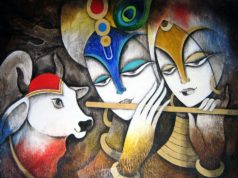BHAGWAD GITA As it is
by Divine Grace A.C.BHAKTIVEDANTA Swami Prabhupada
With over two dozen languages and more than five million hardbound copies in print, undoubtedly, Bhagvad Gita As it is by Divine Grace A.C.BHAKTIVEDANTA Swami Prabhupada is the best selling and widely read classic in world literature.
BOOK REVIEW BY ilaxi @ Amazon
Gita reflects the main literary support for the great religious civilization of India, the oldest surviving culture in the world. This sacred book is well explained, easy to read with sanskrit shlokas well translated and pronunciations made easier. The subject of Bhagvad Gita entails the comprehension of five basic truths. First, science of god is explained and than the position of living entities, jivas. The living entity is controlled by the controller ‘God head krsna’ and the material nature ‘prakriti’ and time, the duration of existence of the whole universe and karma ‘activity’ are discussed. Finally, its god’s wish and he makes or breaks the world! Bhagvad gita is written with 18 chapters – the conversation of krsna with Arjun as brief below:
1. Chapter One: Arjun gives up determination to fight at the battlefield of kuruksetra out of grief n pity when he sees his intimate relatives, teachers and friends in both armies ready to fight and sacrifice their lives.
2. Chapter Two: Krsna begins his teachings to Arjun and explains the distinction bet. the temporary material body and eternal spiritual soul. Characteristics of self realized person is explained.
3. Chapter Three: Karma Yoga i.e. one must engage in activity where actions can bind one to the world or liberate. Perform for the pleasure of god’s will without selfish motives and attain transcendental knowledge.
4. Chapter Four: Transcendental knowledge, spiritual knowledge of the soul, of god and their relationship. Krsna explains history of Gita, purpose and significance of his periodic descents to the material world and the necessity of approaching a guru.
5. Chapter Five: Action performed and their fruits to attain peace, detachments, forbearance, spiritual vision and bliss.
6. Chapter Six: Controlling of the mind and senses and focus on concentration on god (lord is in heart)& explains the meaning of ‘samadhi’ full consciousness of supreme.
7. Chapter Seven: Knowledge of Absolute god. Krsna is the supreme truth and advanced souls surrender unto him in devotion.
8. Chapter Eight : Attaining the supreme god and remembering krsna in devotion whole life n at time of death, one can attain to his supreme abode, beyond material world.(This is one chapter that is always spoken in most Hindu families during ritual rites when someone dies)
9. Chapter Nine: The most confidential knowledge of bhakti – praying to godhead krsna.By reviving one’s pure devotion, one returns to krsna in spiritual realm.
10.Chapter Ten: All power, beauty, grandeur or sublimity, in material or spiritual world are manifestation of krsna.
11.Chapter Eleven: Krsna grants Arjun the vision and reveals his form as cosmic universe and explains his own humanlike form is the original form of godhead and one can perceive only by pure devotion.
12. Chapter Twelve: Bhakti yoga to attain luv of krsna and they develop divine qualities.
13. Chapter Thirteen: Difference bet. body, the soul and supersoul beyond them both attains liberation from material world.
14. Chapter Fourteen:Souls are under the control of three modes i.e.qualities of material nature – goodness, passion and ignorance. How these modes act upon is well explained here.
15. Chapter Fifteen: Detaching oneself from material world and understand godhead. One who understand krsna surrenders to him and become devotional.
16. Chapter Sixteen: Difference of Divine and Demoniac nature is explained here. How to gain spiritual perfection.
17. Chapter Seventeen: Three types of faith evolving from three modes of material nature. Acts performed by those who have faith in passion and ignorance yield only impermanent, material results whereas acts performed in goodness, lead to pure faith in krsna.
18. Chapter Eighteen: The concluding part which explains the meaning of renunciation and effects of the modes of nature on human consciousness and acitivity. Surrendering to god which frees one from sins, bring enlightenment and be eternal spiritual mode.
Krsna says in Gita,
“Aham sarvasya prabhavo, Mattah sarvam pravartate
Iti matva bhajante mam, Budha bhava samanvitah”
Meaning “I am the source of all spiritual and material worlds. Everything emanates from Me. The wise who perfectly know this engage in my devotional service and worship me with all their hearts”
So, if you have read Bible or Koran or any religious book, Bhagvad Gita is a choice ‘Absolute’to read about the ‘Absolute Godhead’ After all, God is a mystery and nobody ever knows who the real person is otherwise I feel, there would be no wars and only peace on earth if Bhagvad Gita Mahima (krsna’s sayings) is followed by humans. A must read.







